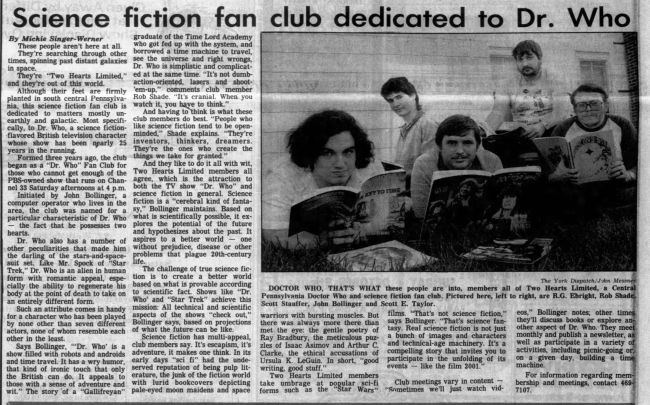Science fiction fan club dedicated to Dr. Who
- Publication: The York Dispatch
- Date: 1988-09-29
- Author: Mickie Singer-Werner
- Page: 29
- Language: English
These people aren't here at all.
They're searching through other times, spinning past distant galaxies in space.
They're "Two Hearts Limited," and they're out of this world.
Although their feet are firmly planted in south central Pennsylvania, this science fiction fan club is dedicated to matters mostly unearthly and galactic. Most specifically, to Dr. Who, a science fiction-flavored British television character whose show has been nearly 25 years in the running.
Formed three years ago, the club began as a "Dr. Who" Fan Club for those who cannot get enough of the PBS-owned show that runs on Channel 33 Saturday afternoons at 4 p.m.
Initiated by John Bollinger, a computer operator who lives in the area, the club was named for a particular characteristic of Dr. Who — the fact that he possesses two hearts.
Dr. Who also has a number of other peculiarities that made him the darling of the stars-and-spacesuit set. Like Mr. Spock of "Star Trek," Dr. Who is an alien in human form with romantic appeal, especially the ability to regenerate his body at the point of death to take on an entirely different form.
Such an attribute comes in handy for a character who has been played by none other than seven different actors, none of whom resemble each other in the least.
Says Bollinger, "Dr. Who' is a show filled with robots and androids and time travel. It has a wry humor, that kind of ironic touch that only the British can do. It appeals to those with a sense of adventure and wit." The story of a "Gallifreyan" graduate of the Time Lord Academy who got fed up with the system, and borrowed a time machine to travel, see the universe and right wrongs, Dr. Who is simplistic and complicated at the same time. "It's not dumb-action-oriented, lasers and shoot-'em-up," comments club member Rob Shade. "It's cranial. When you watch it, you have to think."
And having to think is what these club members do best. "People who like science fiction tend to be open-minded," Shade explains. "They're inventors, thinkers, dreamers. They're the ones who create the things we take for granted."
And they like to do it all with wit, Two Hearts Limited members all agree, which is the attraction to both the TV show "Dr. Who" and science fiction in general. Science fiction is a "cerebral kind of fantasy," Bollinger maintains. Based on what is scientifically possible, it explores the potential of the future and hypothesizes about the past. It aspires to a better world — one without prejudice, disease or other problems that plague 20th-century life.
The challenge of true science fiction is to create a better world based on what is provable according to scientific fact. Shows like "Dr. Who' and "Star Trek" achieve this mission: All technical and scientific aspects of the shows "check out," Bollinger says, based on projections of what the future can be like.
Science fiction has multi-appeal, club members say. It's escapism, it's adventure, it makes one think. In its early days "sci fi" had the undeserved reputation of being pulp literature, the junk of the fiction world with lurid bookcovers depicting pale-eyed moon maidens and space warriors with bursting muscles. But there was always more there than met the eye: the gentle poetry of Ray Bradbury, the meticulous puzzles of Isaac Asimov and Arthur C. Clarke, the ethical accusations of Ursula K. LeGuin. In short, "good writing, good stuff."
Two Hearts Limited members take umbrage at popular sci-fi forms such as the "Star Wars" films. "That's not science fiction," says Bollinger. "That's science fantasy. Real science fiction is not just a bunch of images and characters and technical-age machinery. It's a compelling story that invites you to participate in the unfolding of its events — like the film 2001."
Club meetings vary in content — "Sometimes we'll just watch videos," Bollinger notes; other times they'll discuss books or explore another aspect of Dr. Who. They meet monthly and publish a newsletter, as well as participate in a variety of activities, including picnic-going or, on a given day, building a time-machine.
For information regarding membership and meetings, contact
Caption: DOCTOR WHO, THAT'S WHAT these people are into, members all of Two Hearts Limited, a Central Pennsylvania Doctor Who and science fiction fan club. Pictured here, left to right, are R.G. Ebright, Rob Shade, Scott Stauffer, John Bollinger and Scott E. Taylor.
Disclaimer: These citations are created on-the-fly using primitive parsing techniques. You should double-check all citations. Send feedback to whovian@cuttingsarchive.org
- APA 6th ed.: Singer-Werner, Mickie (1988-09-29). Science fiction fan club dedicated to Dr. Who. The York Dispatch p. 29.
- MLA 7th ed.: Singer-Werner, Mickie. "Science fiction fan club dedicated to Dr. Who." The York Dispatch [add city] 1988-09-29, 29. Print.
- Chicago 15th ed.: Singer-Werner, Mickie. "Science fiction fan club dedicated to Dr. Who." The York Dispatch, edition, sec., 1988-09-29
- Turabian: Singer-Werner, Mickie. "Science fiction fan club dedicated to Dr. Who." The York Dispatch, 1988-09-29, section, 29 edition.
- Wikipedia (this article): <ref>{{cite news| title=Science fiction fan club dedicated to Dr. Who | url=http://cuttingsarchive.org/index.php/Science_fiction_fan_club_dedicated_to_Dr._Who | work=The York Dispatch | pages=29 | date=1988-09-29 | via=Doctor Who Cuttings Archive | accessdate=5 December 2025 }}</ref>
- Wikipedia (this page): <ref>{{cite web | title=Science fiction fan club dedicated to Dr. Who | url=http://cuttingsarchive.org/index.php/Science_fiction_fan_club_dedicated_to_Dr._Who | work=Doctor Who Cuttings Archive | accessdate=5 December 2025}}</ref>
